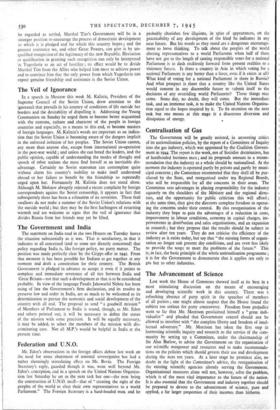The Advancement of Science
Last week the House of Commons showed itself at its best in a most stimulating discussion on the means of encouraging and developing scientific work in this country. There was a refreshing absence of party spirit in the speeches of members of all parties ; one might almost suspect that the House found the subject too serious for party controversy. Freedom from prejudice went so far that Mr. Morrison proclaimed himself a "great indi- vidualist" and pleaded that Government control should not be allowed to interfere with "the complete liberty and freedom of intel- lectual adventure." . Mr. Morrison has taken the first step in harnessing scientific inquiry and research to the service of the com- munity by setting up a Committee, under the chairmanship of Sir Alan Barlow, to advise the Government on the organisation of our scientific manpower and resources and to make recommenda- tions on the policies which should govern their use and development during the next ten years. At a later stage he promises also, no doubt in the light of the Committee's advice, the reorganisation of the existing scientific agencies already serving the Government. Organisational measures alone will not, however, solve the problem, which is of the most vital importance to the• future of the nation. It is also essential that the Government and industry together should be prepared to devote to the advancement of science, pure and applied, a far larger proportion of their incomes than hitherto.






























 Previous page
Previous page